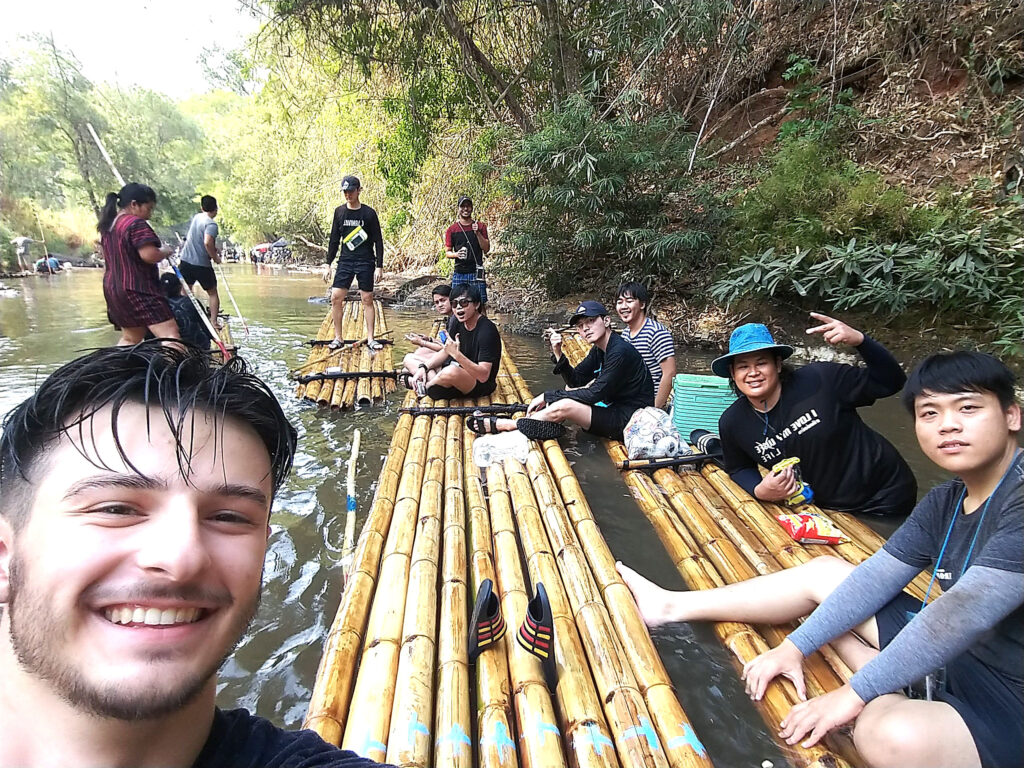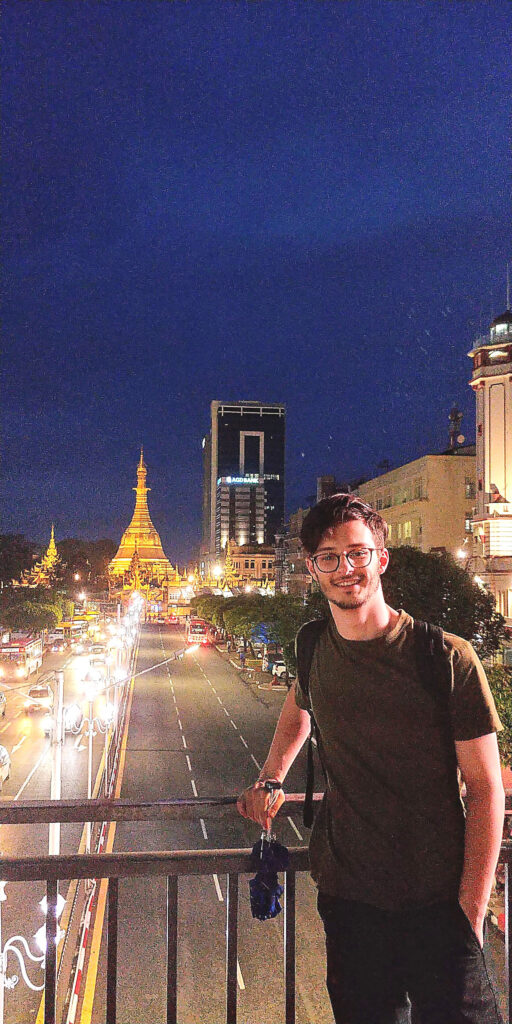
By Teddy Rydquist
Leader Staff Writer
A 2016 Oxford High School graduate, Leo Baldiga has always shown tremendous time management skills and the ability to stand out among his peers in the classroom.
Continuing his education at Michigan State University (MSU) in East Lansing, he graduated with a 3.9 grade point average in the Class of 2020 with a bachelor’s degree in Comparative Cultures & Politics (CCP) and a minor in Bio-Ethics.
Baldiga achieved his degree in the standard four years despite changing his major early on in his collegiate tenure.
“I came into MSU initially wanting to do journalism,” he shared. “I took a bunch of journalism classes, but I wasn’t fulfilled because none of them had anything to do with writing, so I switched my major and that’s how I got into all this kind of stuff.”
This move to the CCP program admitted Baldiga into MSU’s James Madison College, which features undergraduate students interested in public and international affairs. Founded in 1967 and named after the United States’ fourth President, who was instrumental in the drafting of our nation’s Constitution and Bill of Rights, the James Madison College makes up roughly three-percent of MSU’s undergraduate body.
MSU’s current Director of Athletics, Bill Beekman, is a graduate of the James Madison College and about 15-percent of its students are admitted into the Honors College.
“The thing about James Madison is it’s a residential college,” Baldiga pointed out. “What that means is, all the kids who come in as freshmen, are in the same dorm together, which is very intense because they spend so much time together.
“I had the experience of living in a separate dorm and coming into that, which I think was really beneficial for me.
“It’s a really interesting sort of pedagogy, the way they go about it. Everything is, you read for class, take notes, and you must come to class prepared to talk about what you read. If you don’t come to class prepared to talk about what you read, you’re going to have a hard time getting higher than a three-point (GPA). Typically, about 30-percent of your grade is class participation.”
During his time as an undergraduate student, Baldiga worked alongside two MSU professors, Daniel Ahlquist and Amanda Flaim, to publish three research works, one of which he traveled to Vancouver, British Columbia to present at the International Conference on Human-Computer Interaction as a freshman.
“The Vancouver trip was very coincidental. I feel like a lot of the academic success I’ve enjoyed has been the result of me meeting the right people at the right time,” Baldiga humbly stated.
“So, freshman year, I took this one-credit seminar class, Disability in a Diverse Society was the name of the class. It was taught by a graduate student and we had to do a presentation at the end of the class, and the graduate student was like, ‘Hey, this is pretty good, you guys want to turn this into a paper? I’ll help you get it published.’
“We spent the next two-to-three months getting it in publishable shape, submitted it for review for the Vancouver conference, and it was accepted. The entire team couldn’t make it to go present it, but myself, the graduate student, whose name is Phil, and another student, Jacob, went and presented it and it was a lot of fun.”
In addition to his academic duties, Baldiga also played the mellophone in the MSU Marching Band for his first two years, something he did all four years during his time at Oxford High School.
With the band time requirements rivaling that of a full-time job, he elected to step away after his sophomore year to allocate more time to his studies. This increase in availability also enabled Baldiga to become involved with “Reclaim MSU,” an alliance of staff, faculty, and alumni working to create institutional and cultural change on the Spartans’ campus, and volunteer at the Refugee Development Center in Lansing.
“Reclaim MSU was basically a student activist group formed with regard to the university’s terrible handling of the (Larry) Nassar scandal,” he explained.
Nassar, a disgraced former USA Gymnastics national team doctor and osteopathic physician at MSU, has been accused of assaulting at least 250 young women and girls dating back to 1992. He plead guilty to seven counts of sexual assault of a minor and was sentenced to 175 years in prison on January 24, 2018, all but ensuring he will spend the rest of his life behind bars.
“I wish I had been more involved in that, but I was taking too many credits at the time to really throw myself into it,” Baldiga continued. “But I felt it was important, and I went to a few of the board meetings to see what they were doing. It was a weird situation with MSU’s administration and Board of Trustees.”
Although he has completed his studies at MSU, Baldiga will continue to conduct research on a global level. He is scheduled to travel to Thailand in January to begin a 10-month investigative research program looking into how their citizens access health care and services, something that is particularly timely with the ongoing coronavirus (COVID-19) pandemic.
This was made possible through his status as a 2020-21 Fulbright Scholar. Established by former U.S. Senator J. William Fulbright (D-Arkansas) in 1946, the program provides roughly 8,000 scholarships annually, with only about 1,600 of those going to U.S. students.
“It’s a lot all up front,” Baldiga said of the Fulbright application process. “You need to get all your letters of recommendation together, get your grand proposal together, talk to all the right people who will check the boxes for you, get all your paperwork filled out.
“That all happens in October, then six months go by, and you hear absolutely nothing. And then you find out whether you got it. In my case, it was funny how it all played out. They sent me an e-mail on March 10, which was when everything was falling apart (because of COVID-19), so I didn’t realize I got it until a few days later when I was going back through my e-mails.”
The upcoming trip to Thailand will be Baldiga’s second trip to the nation. In 2019, he performed a four-month internship in Bangkok, Thailand’s capital city, working for a non-governmental organization (NGO) called Isara.

“They run a hotline and a bunch of different social programs for migrant workers who come from Burma to Thailand,” he said of Isara’s daily activities. These workers primarily work in the fishing industry, but also garments and manufacturing. The hotline is so workers can call in and report a boss who is verbally abusive, or whatever the case may be.
“Isara partners with a lot of American and European brands, and they aggregate all the complaints on the ground on the hotline and can go to the corporation and say, ‘Your supplier is doing this and this, you need to call them and tell them to cut it out.’
“That’s the model. It doesn’t always work out that way, but that’s the idea.”
Following the completion of his second stint in Thailand, Baldiga, who can speak or read five different languages, is considering a couple of different options for graduate school.
“I’m thinking about applying for grad school this year to attend next year, or apply next year to attend the year after,” he shared “Most likely in the United Kingdom because there’s a couple of programs, a public health program and a development program, I’m interested in. I’m thinking about applying for the Marshall Scholarship from MSU.
“The Marshall Scholarship is a bit more selective than the Fulbright because it’s more money and you have to be nominated by MSU. First, you must apply through MSU, and they decide if they want to recommend you as a candidate, and there’s a board you must go in front of and they grill you with questions.
“Then, if you make it through that, they’ll send it to the Marshall program and they’ll grill you with questions, too. Plus, you need to be accepted into the grad program or programs you want to do. So, it’s a lot to pull off.”

Nice work Leo. So proud of you & look forward to what comes next.
Love,
Dad